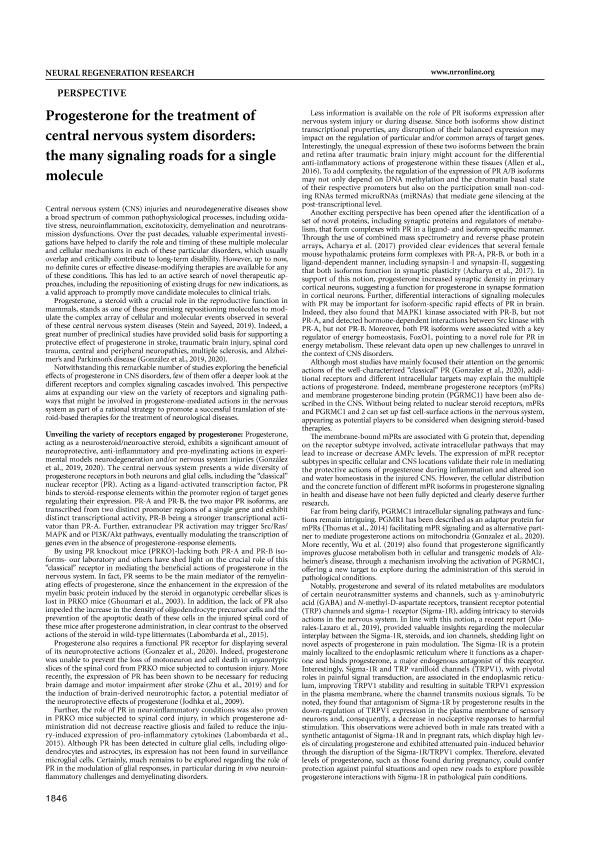Artículo
Progesterone for the treatment of central nervous system disorders: the many signaling roads for a single molecule
Fecha de publicación:
04/2020
Editorial:
Chinese Association of Rehabilitation Medicine
Revista:
Neural Regeneration Research
ISSN:
1673-5374
e-ISSN:
1876-7958
Idioma:
Inglés
Tipo de recurso:
Artículo publicado
Clasificación temática:
Resumen
Central nervous system (CNS) injuries and neurodegenerative diseases show a broad spectrum of common pathophysiological processes, including oxidative stress, neuroinflammation, excitotoxicity, demyelination and neurotransmission dysfunctions. Over the past decades, valuable experimental investigations have helped to clarify the role and timing of these multiple molecular and cellular mechanisms in each of these particular disorders, which usually overlap and critically contribute to long-term disability. However, up to now, no definite cures or effective disease-modifying therapies are available for any of these conditions. This has led to an active search of novel therapeutic approaches, including the repositioning of existing drugs for new indications, as a valid approach to promptly move candidate molecules to clinical trials. Progesterone, a steroid with a crucial role in the reproductive function in mammals, stands as one of these promising repositioning molecules to modulate the complex array of cellular and molecular events observed in several of these central nervous system diseases (Stein and Sayeed, 2019). Indeed, a great number of preclinical studies have provided solid basis for supporting a protective effect of progesterone in stroke, traumatic brain injury, spinal cord trauma, central and peripheral neuropathies, multiple sclerosis, and Alzheimer’s and Parkinson’s disease (González et al., 2019, 2020). Notwithstanding this remarkable number of studies exploring the beneficial effects of progesterone in CNS disorders, few of them offer a deeper look at the different receptors and complex signaling cascades involved. This perspective aims at expanding our view on the variety of receptors and signaling pathways that might be involved in progesterone-mediated actions in the nervous system as part of a rational strategy to promote a successful translation of steroid-based therapies for the treatment of neurological diseases.
Archivos asociados
Licencia
Identificadores
Colecciones
Articulos(IBYME)
Articulos de INST.DE BIOLOGIA Y MEDICINA EXPERIMENTAL (I)
Articulos de INST.DE BIOLOGIA Y MEDICINA EXPERIMENTAL (I)
Citación
Gonzalez, Susana Laura; Progesterone for the treatment of central nervous system disorders: the many signaling roads for a single molecule; Chinese Association of Rehabilitation Medicine; Neural Regeneration Research; 15; 10; 4-2020; 1846-1847
Compartir
Altmétricas




